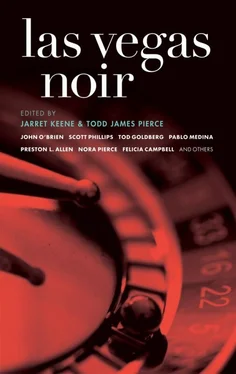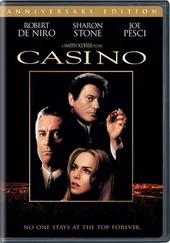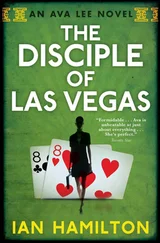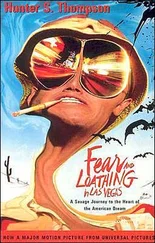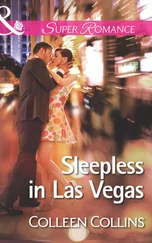“Open!” Talon boomed.
The only decorations on the professor’s walls were a spear-thrower and three arrows. He sat entombed in his piles of papers and journals, fixed Ortiz with his glittery blue gaze, and waited for him to state his business.
“I was thinking about writing my thesis on the Mictlanos,” Ortiz said.
“Mictlanos, ey? What do you know about the Mictlanos?”
“Not much. That’s why—”
“What aspect? What in particular do you want to write about?”
Ortiz hadn’t really thought it through. But he’d been thinking about the slaps he’d heard that night in Las Vegas, the woman’s cries, the bruise she’d shown him, Vicente’s piggish face, and so he said, “Gender relations?”
“Well, that would be fashionable,” Talon said. “Easy, too. Gender relations among the Mictlanos basically revolve around the cinchazo . Do you know what the cinchazo is?”
Ortiz allowed that he did not.
“The cinchazo is the blow a man gives to his woman with the flat side of his machete. It pretty much settles everything, at least from the man’s point of view. It’s very difficult to get the women to talk about it, even to other women. If you intend to do fieldwork on that, you’d best be very, very careful.”
Talon drew from one of his piles of papers an article he’d written about the Mictlanos and gave it to Ortiz. Apparently it was a detailed account of the ritual fight between the two Mictlano males that Ortiz had already heard about in Talon’s lectures. Ortiz tucked the article in his satchel, thanked the professor, and took his leave.
The next day, Ortiz took off for Las Vegas feeling elated. So the famous Professor Talon had a hard time getting Mictlana women to open up to him. Well, as far as Ortiz was concerned, the young Mictlana woman had already opened up to him by revealing her bruise. She wanted to talk about it. Perhaps that was because he himself was Native, or looked it. Or because he simply inspired trust. Talon was, let’s face it, a loud, aggressive European. It was surprising any Native peoples at all had ever confided in him.
Pleased with the thought of someday surpassing Talon as an ethnographer, Ortiz hadn’t yet bothered to read the article the professor gave him, but as he drove he plucked it from his satchel and began his reading-on-the road game. As always in this game, the meaning of the text wasn’t going to sink in immediately; the fun would come later when the words, carved in his mind by the danger, came back to him verbatim, as if out of nowhere, triggered by some stress.
Ortiz glanced up just in time up to see a deer or an antelope bounding — no, flying — across the hood of his car. Some kind of hoofed thing, anyway: The cloven hoof came down on his exterior rearview, shattering it. Holy fucking shit. Behind him, the creature continued bounding across the desert in great leaps.
Ortiz stuffed the article in his satchel and took the wheel with both trembling hands. Enough foolishness. He kept his eyes on the road the rest of the way to Vegas.
The sun had already set by the time he got to the city. With a frisson of professional satisfaction, he turned his car away from the lights of the Strip and headed into the dark barrio of his study. The only things he could see were what his headlights illuminated: the potholed street, and at the end of it, the elm tree.
The tree had been hideously lopped, its stumped limbs raised in supplication to the heavens. Who would do such a thing to a tree, especially here in the desert, where shade was so needed? But again, it wasn’t his place to pass judgment on these people. They needed the wood for their carvings, after all. Or maybe they turned it into charcoal for cooking, as people did all over the Third World.
Speaking of charcoal, the two men digging behind the huts were no doubt preparing a barbeque pit for the fiesta. That meant the food was a long ways from being ready. Maybe this was to be some sort of drawn-out, all-night fiesta; Ortiz regretted not having gotten something to eat on the road.
Nor should he be drinking on an empty stomach, but already the man who had invited him to the baile had thrust into his hand a big plastic glass of chicha , the traditional Mictlano fermented corn drink. So okay, cool, let the party begin.
The man ushered him to a rickety metal table set up in one corner of the dusty courtyard. Two other men joined them. Another metal table had been set up in the corner opposite. The only illumination came from a dim kerosene lamp suspended from a wire running from the roofs of two of the huts. But it was enough to allow Ortiz to see Vicente’s squat body take a seat at that table opposite.
A four-man band emerged from the shadows and struck up vigorous binary rhythms on an accordion and chicken-scratch strings. The men at Ortiz’s table urged more milky chicha on him. The drink was cool, if a bit acid. Probably quite nourishing. He drank and listened to the homely music and smiled at his friends. The red neon ¡Viva! sign shone bright in the distance.
Then, as if choreographed, a group of women assembled themselves in the fourth corner of the courtyard, all dressed in colorful skirts and blouses. Among them was the woman with the bruise. She glanced at Ortiz’s table, then at Vicente’s, then dropped her gaze to the ground.
Men from both tables began taking women to dance, though not before first asking the woman’s husband or boyfriend for permission. Ortiz watched the dancers shuffle in the dust, and loved them. He felt deeply connected to them, to these people whose ancestors — and his, on his Native side — had crossed the Bering Strait and made that immense and brave journey down into Mesoamerica, where they had built vast empires. Now they had returned back north, to the great Nevada desert, where he was ever so fortunate to be witness to their ancient rites.
Okay — maybe he didn’t love Vicente so much. Vicente remained at his table, sipping his chicha morosely and refusing to look in Ortiz’s direction. Ortiz supposed he should have gone to his table right off and greeted him and the other men seated there. Well, he could do that now. He would drink with them. He would win them with his smile.
He stood, swaying slightly. The men with him pushed their chairs from the table. The band struck up a fast-tempoed tune. Ortiz made it halfway across the courtyard when someone pressed a machete into his hand.
And that’s when, in its exact wording, Talon’s text came to him, as if written in the dark air before him:
The disputed woman’s husband smashes the lantern withhis machete, and the baile is plunged into darkness. Themachetes of the two rivals strike each other, ringing inthe night. Cries and insults from all sides reach a joyfulcrescendo. After the clashing of the machetes is over, abrief silence ensues, until a voice shouts, “Get a light overhere!”
A new lantern is lit. It illuminates a group of mensurrounding a dead man. The dead man’s companionscarry his body to the freshly dug grave, while others throwdirt on the pool of blood on the dance floor. Regardless of whether the dead man is the disputed woman’s husbandor his rival, she weeps copiously and goes to her house, accompanied by female friends or relatives. The victoriousman goes back to his table and shouts for more chicha allaround, and the band strikes up anew.
Soon the men who have buried the dead man emergefrom the shadows. They join the victor at his table and forthe rest of the evening they celebrate his triumph, and thecommunity is unified once again.
It was funny. If they wanted him to, he could recite it for them right there in the middle of the courtyard, as if he were addressing an audience of academics. The litany of gibberish might amuse them. But already the lantern was smashed, and the scene, just as Professor Talon’s article said, was plunged into darkness.
Читать дальше
